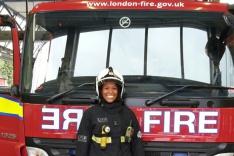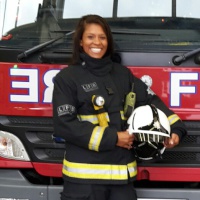Employers and Universities: Work with us?

60 Second Interview: Firefighter
Verona Clarke has wanted to be a firefighter since she was a child, but she didn’t think it was an option for women. Now, five years into her successful career in the fire service, she’s proven that’s not the case at all.

Name: Verona Clarke
Company: London Fire Brigade
Industry: Police, Security & Emergency Services
What is your job? Watch manager
How long have you been doing this job? Five and a half years
Education
University: Brighton University
Degree subject: Sociology and social policy
A-Levels: Sociology, English literature, textiles, PE
What was your very first job?
Shop assistant for Dorothy Perkins when I was 16.
What did you want to do when you were at school?
I was very unsure at first as I wanted to work in the fire service but it didn’t seem like women were firefighters, so I started to think if I chose subjects I was interested in for college and university I would find my career.
What made you want to do your current job?
I had family members who were in the fire brigade and when I was younger there was a program called Blues and Twos that I was obsessed with – that made me realise I wanted to help people through emergency response.
How did you get there?
I visited my local fire station and spoke with the on duty watch about their roles and then I went to an open day run by headquarters.
Through this I started a specific personal training regime to ensure when the recruitment for firefighters started, I was ready to pass all aspects of the process. I then applied as a graduate entrant and here I am five and a half years later.
What is a typical day at work like?
I am in charge of nine people, two crew managers and seven firefighters. I have two fire engines at my station; one being a specialist aerial ladder.
Every day is different, but each day features at least two hours of training to refresh our skills, community safety work and putting up smoke alarms as well as answering emergency calls.
When I attend an operational incident I am the person with the white helmet in charge of all the firefighters.
What’s the best thing about your job?
Every day is completely different. People are usually very welcoming when they see you and you leave at the end of your shift knowing you’ve made a real difference to peoples’ lives. It’s a very rewarding career.
What is the most challenging thing about your job?
Operationally I sometimes see and hear things that I wish to never hear again but the nature of the job I’m in can make those things regular occurrences.
The flip side to that is the good experiences by far outweigh the bad, we save thousands more people than are seriously injured or lost.
What advice do you have for people who want to do what you do?
Go to school, college and university, I loved my time at uni and it really opened my eyes to “the real world”, it all helped me get to where I am today.
You need to have an interest in fitness, my job isn’t for the unfit and most of all you need to have a passion for people. My job is never going to make me rich or be able to drive a really fancy car, but I go home every day or night knowing I have directly impacted on somebody’s life and for the better.
That feeling, believe me, is better than any material possession.
What things do you wish you’d known before starting your career?
Nothing. I was very sure I wanted this career and I wouldn’t do it any differently as I don’t regret getting my degree. I could have joined the brigade at 18, but my time at university was an invaluable experience for me.
Where would you like to be in five years?
Ideally still in this job or maybe a borough manager within the brigade. A borough manager oversees the running of the stations in the borough, which is usually made up of around three to five fire stations.
For more information about a career in the fire services, have a look at our article on how to become a firefighter.
